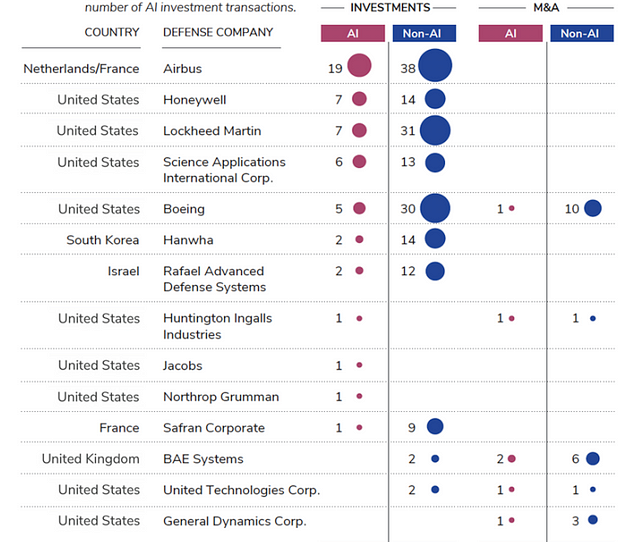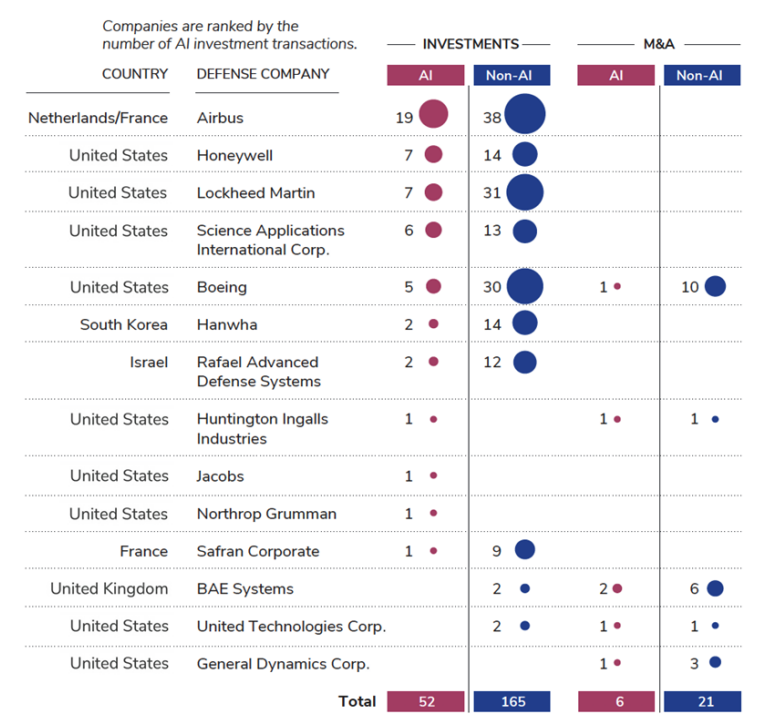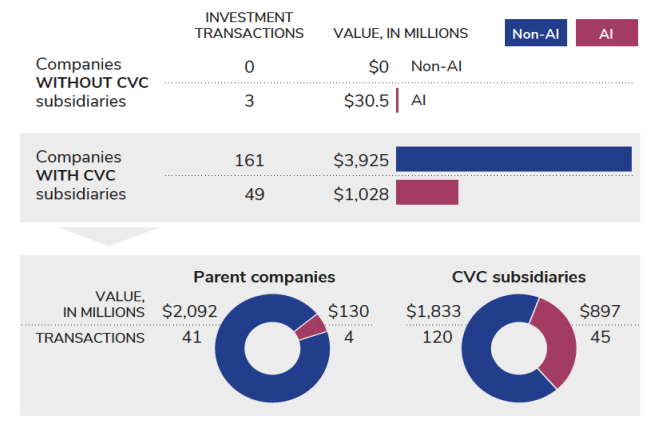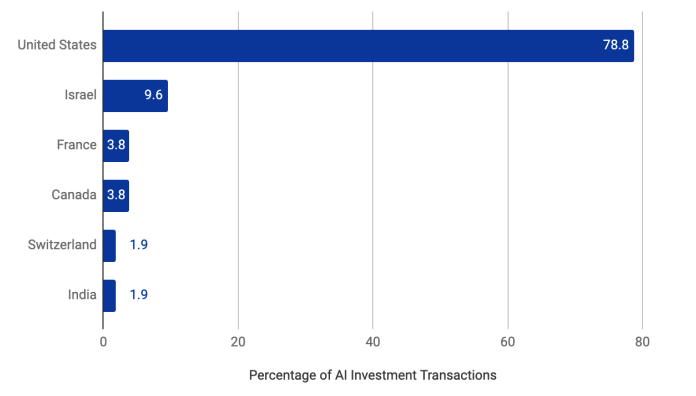Friday Brief for 22 October 2021

🚨🚨🚨Heads Up🚨🚨🚨
I joined Steve Hayes and Sarah Isgur on The Dispatch podcast to talk about the latest on China’s hypersonic missile test, my views on the growing tensions between Washington and Beijing, and how the U.S. Intelligence Community thinks about these things. Be sure to listen and linked below is my op-ed from earlier this week.
Tech Terms
Fork (fôrk) — In software development, a fork is a new application developed from an existing one. When an application is “forked,” it creates a new, separate program, rather than a new development branch.
Defense Companies Are Not Buying AI
What’s New: A new report by the Center for Security and Emerging Technology (CSET) maps how the globe’s top 50 defense companies are approaching artificial intelligence (AI).
Why This Matters: Oddly, it appears very few of these companies are investing in or acquiring private AI companies — neglecting a critical pathway to private sector expertise and capabilities.
Key Points:
AI is an essential dual-use technology — capable of broad economic, social, and military applications.
While some of the most pioneering AI work is being done by the tech titans like Google, Facebook, and Microsoft, there are thousands of smaller companies who are doing novel and important AI research and application.
Defense companies seeking to leverage AI for themselves and for their clients essentially have three ways of getting AI expertise and capabilities: in-house R&D, research partnerships with R&D programs at outside institutes and universities, and investments and mergers and acquisitions (M&A).
In-house R&D is very expensive and puts defense contractors in direct competition for talent with the world’s most wealthy, innovative, and agile tech leaders — typically not a winning strategy.
Outside partnerships are important, but can be slow and do not always result in broad, commercial applications.
Investing in and acquiring private AI companies, on the other hand, can be an efficient way for defense companies to build their expertise, talent base, and commercial products. This can also be a type of “bridge” between the private sector and the government.
But most of the world’s top 50 defense contractors, according the CSET analysis, are not meaningfully investing in or acquiring private AI companies.
Total Top Global Defense Company AI and Non-AI Investment and Mergers & Acquisitions (M&A), 2013-2020

Importantly, Defense companies that have a corporate venture capital (CVC) fund or subsidiary are far more likely to invest in AI companies.
Investments in AI and Non-AI by Eleven Defense Companies with and without Venture Capital Subsidiaries (CVC), 2013-2020

Finally, U.S.-based AI companies were the ones most likely to receive investments or to be acquired.
U.S.-based AI Companies are the Top 50 Global Defense Companies’ Primary AI Investment Targets, 2013-2020

What I’m Thinking:
I’ll let CSET take it from here.
“The findings presented in this paper suggest that there is little AI investment and M&A activity initiated by the largest global defense companies since the major AI/ML [artificial intelligence/machine learning] breakthroughs in late 2012. It is important to understand that the lack of dependency on investment and M&A to access commercial AI technology is not equivalent to the absence of AI capabilities and capacity within the major defense companies. It is possible that major global defense companies are accessing AI either using subcontract relationships on a project-by-project basis or by developing integrated AI internally. It is also possible that major global defense companies may not believe AI is mature enough for integration into embedded systems and products at this point, or that defense company investors are perhaps not ready to tolerate the risk and uncertainty of investment returns associated with emerging technologies and early-stage investment.”
Three Thoughts on Three Quantum Developments
What’s New: The White House recently held a summit on quantum industry and society, the Department of Homeland Security (DHS) has issued a roadmap to post-quantum cryptography, and “spies may be storing data to decrypt in the future.”
Why This Matters: You’re going to be hearing more and more about quantum computing over the next 5-10 years and the implications of this technology are difficult to overstate.
Key Points:
To start, if you don’t know what quantum computing is, watch this video for a one minute primer.
Recently, the Biden Administration hosted leaders from quantum information technology companies to discuss “the applications of quantum information science, the barriers for transitioning quantum R&D concepts into products or services in a global market, and the potential societal impact of quantum technologies.” There seemed to be broad consensus on the need for better STEM education and growing the nation’s ability to test quantum technologies.
The DHS published its strategy for transitioning to post-quantum cryptography, telling agencies to begin inventorying their most important data and systems and to flag systems currently using public-key cryptography — whose encryption could be broken by a quantum computer. The National Institute of Standards and Technology (NIST) is also preparing encryption standards for the post-quantum world.
Finally, an article at The New Scientist speculates that governments like China may be stealing encrypted data whenever they can, in the hopes that quantum computers will allow them to decrypt and exploit this data in the future.
What I’m Thinking:
Continuity is good. Quantum science really is the next frontier of science and of computer science particularly. The Trump administration deserves credit for its efforts to get our government oriented on this issue and the Biden administration deserves equal credit for staying focused on the task. While the summit was a bit of political theater (they all are), the team in the president’s Office of Technology Policy are top notch and appear to be continuing to push forward.
Encryption, huh, what is it good for? Absolutely everything! Secure networks and data are essential for how we bank, communicate, do business, and pretty much everything else in life. If it plugs in, turns on, or connects, it should probably be encrypted. Today’s encryption is very strong against today’s computers. A fully functioning quantum computer, however, could break this encryption almost immediately. This is why DHS and NIST are preparing “roadmaps” and standards. This is obviously a good thing; but, I wish we were doing it faster and also issuing not-so-veiled threats of bodily harm to any agency head that fails to implement these changes.
Yes, China and others are stealing stuff they cannot use — yet. Cloud computing and modern networking essentially allow limitless data acquisition and storage. Of course spy agencies are gathering anything and everything they can, worrying about how they’ll use it later. The scary thing is that there’s growing concern in the American government and in industry that China may be ahead of the U.S. when it comes to quantum computing. Even more, if Beijing were to leap ahead, they would be highly incentivized to keep this secret as long as possible so that they could pilfer as much intelligence as possible without speeding an American upgrade to quantum encryption. This is now a real possibility.
Army Testing Large-Scale Autonomous Tank Maneuvers
What’s New: The Army will test a full company of unmanned battle tanks in a wargame next year, according to Defense One.
Why This Matters: The Army is not only pioneering autonomous land systems, but also their acquisition.
Key Points:
The Army has contracted five companies to build prototype drone tanks: Point Blank Enterprises, Oshkosh Defense, BAE Systems Land and Armaments, General Dynamics Land Systems, and American Rheinmetall Vehicles.
Thus far, the force’s largest autonomous tank exercise was a platoon-sized effort at Fort Carson, Colorado last year.
“Now we’re moving it up to company level,” said Gen. Ross Coffman, the director of Army Futures Command’s Next Generation Combat Cross-Functional Team. “The lessons learned here, we can now then apply to a brigade and to a division and see how we want to fight with these things in the future. But I know of no country that has done above singular vehicle experiments. So, no antecedent.”
What I’m Thinking:
The tech is cool, but the way the Army is going about its acquisition and deployment is even cooler. In the past, the Pentagon has frequently required the IP rights of hardware and software developers supporting the military. This was an especially big problem for non-traditional tech companies who leverage their IP for sales to non-government customers. For example, there are lots of buyers for autonomous driving software beyond the military and most of the underlying code is broadly applicable. This is where Gen. Ross and his team are being very, very smart. This will allow the government to ride the commercial wave as AI and autonomous systems get better and better.
“The government controls the interfaces, the standards and the way data is moved around the system. But we don’t necessarily need to control the individual black boxes or the processors or the individual sensors. We just need to control the way that they communicate with one another. So we don’t buy [intellectual property] that we don’t need but that we have the ability to remove a modular component and replace it with a different one without re-architecting and redesigning the entire system,” said Michael Cadieux, director of ground vehicles for U.S. Army Development Command.
Let’s Get Visual

Nerd Humor

Quick Clicks
AI can see through you: CEOs’ language under machine microscope
U.S. pursues a unique solution to fight hackers that revolves around esports
Ransomware gang masquerades as real company to recruit talent
That’s it for this Friday Brief. Thanks for reading, and if you think someone else would like this newsletter, please share it with your friends and followers. Have a great weekend!
